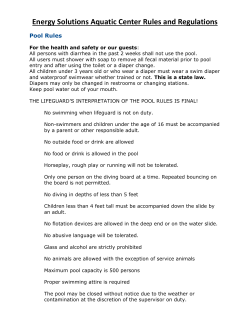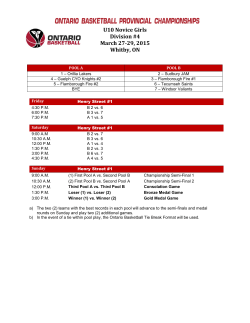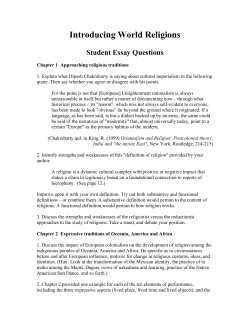
The River of Life a theology
THE RIVER of LIFE - ecumenicalism rampant Mankind's search for transcendent truths has been an inspiring one, at times only for its fervor, but often for the seriousness and purity of its motives. Across history and the planet, countless people have given their lives for a glimpse of the reality that lies beyond our five senses. What has emerged is a remarkable consensus, just short of unanimity, on two points: 1. we share the space in which we live with “something” that we do not generally see, and 2. the existence of that “something” has implications for how we ought to behave. These conclusions have often had a salutary effect on human behavior. They have been used as the backbone of most moral systems that sought to raise human behavior above the brute. Whether religion has, in net, been a force for good or evil in human history is unclear to me. Whatever the good that can be attributed to organized religions, I believe that most of them suffer from three related failings. A truly successful theology must avoid these pitfalls, which have been the source of so much sorrow throughout history. #1. The whole truth I believe that many of those who have sought higher truth have succeeded, with a recurring flaw: they have, almost without exception, believed that the sliver of truth they saw constituted the whole truth. I prefer to start with the belief that virtually all religions are, at least in some part, correct and to try to mine the human experience for all its wisdom rather than insisting on wasting major portions of it by succumbing to the difficulty of reconciling vastly different views of reality. Religions encourage adherents to believe that they have seen the truth instead of a truth. That single failing has been responsible for countless acts of bigotry and persecution. It is much easier to treat other people badly if we can start from the knowledge that these “others” are wrong about the most important truths of all. #2. Ritual and Myth The second accusation that I will level against most religions is that they misunderstand the roles of myth and ritual. I have no doubt that recurring, stylized actions and stories can do much good. They provide focus and a sense of communality. A god would want these sorts of focusing, purifying, collectivizing behaviors. But I cannot believe that higher cosmic powers really care much about the precise details of ritual. I refuse to believe that salvation awaits only those who have dressed in some way, or chanted in some particular direction. I must believe that deities are more (or perhaps less) selective and discerning than that. In fact, the importance attached to ritual in most religions deserves to be thought of as a kind of idolatry: the rituals themselves become the objects of worship, obscuring rather than revealing the truth to which they should lead. It has been said that when someone points out the moon to you, it is important that you look at the moon, not at the finger. An excruciating example of ritual run amok is the use of the Lord's Prayer. Jesus offered it as an example of how one should pray, as a precise antidote to the mindless chanting of prayers with no heed to their content. Christianity's response to Jesus’ gift of rhetoric has been to turn it into a mindless chant. He must be disappointed. In the same Sermon on the Mount, Jesus cautions against religious leaders who dress up in fancy costumes and parade their prayers before the public. Has the Pope never read this passage? Christianity is, I think, no worse than most other religions in mistaking useful activities for salvation-laden duties, and for mistaking the metaphorical truths of myth and revelation for literal descriptions of fact. The god of Christianity has shown himself to be a fine poet, a high-order user of metaphor. If the example of Jesus, a master user of parable, is to be extrapolated, one can assume that god rarely says anything literally. My personal suggestion for myths would be to attach them to natural cycles. It is certainly not an original suggestion but I would opt for the year’s four major holidays to be on the solstices and the equinoxes. Christian mythology is only enhanced by assuming that God is poet enough to send his messenger to the world on the year's shortest day and to have him rise from the dead at the beginning of Spring. Certainly rituals anchored to the seasons could, as natural facts, be agreeable to many people as moments worthy of celebration. #3. Politics The third historic failing of religion has been its propensity to be co-opted and pressed into the service of political forces. It is striking how many political conflicts have religious overlays that exacerbate, often by disguising, the underlying political and economic motivations. The few who want power can often get it by appealing to the profound emotions that religion evokes in the many. A theology I will present my personal theology with the understanding that it must be considered metaphor. If there is a universe of the spirit outside of our own, it is unimaginable that I would discern its details. With that caveat, I will proceed to write as if I firmly believe what follows. The nature of the individual Each of us is made of, and carried by, a flowing, thinking river of energy that is Life. We are each merely separate parts of the river, walled off from it by a membrane that defines each of us as a separate unit and confers a degree of autonomy, allowing us to wiggle from side to side of our own free will, while being carried by a greater force for a greater purpose. Happiness, I presume, comes from discerning and carrying out Life's purpose. Birth and death An individual is born when a part of the River congeals and adheres sufficiently to create a distinct unit, surrounded by a permeable membrane. Throughout the life of the individual there is an exchange of energy across the boundary between the individual and the River. When the wall weakens sufficiently to release the energy back to the River the individual dies. Several possibilities occur here. Let’s explore one. Reincarnation Reincarnation occurs if one membrane, as it falls away at death, is replaced sufficiently quickly with another membrane so that most of the material remains intact. The new individual thus consists of primarily the same "stuff" as did the deceased. Note that reincarnation -- the erection of a new wall about a piece of the moving river -- would be more likely if the deceased possessed a good deal of cohesiveness: "integrity" seems the perfect word to describe what would be required for one to survive the leap from one skin to the next. A poorly defined personality would be likely to dissipate when exposed to the rush of the River. This suggests a sequence of objectives across different lives. The first objective would be to construct a sturdy wall -- to create a sense of "self" strong enough to survive the leap of death. The River would want us to do that. Given that the River has its purposes for each of its parts, being able to use the same material across several lifetimes would be useful. But here's the rub: strengthening the wall has the effect of impeding the exchange of energy between the individual and the River -this is detrimental to both of them. The individual is less controllable for the overarching purpose of the River, and the individual is denied access to the energy of the River. So the second objective of the individual is to dissolve the wall to permit a two-way energy flow while maintaining structural integrity. While the "building" phase of a personality would be marked by concern about one's self, and by preoccupation with establishing and defending one's identity, the second phase would be marked by openness and lack of ego. People in the first, less mature, stage are likely to be pushy and egocentric. Unpleasant as it may be, it is a necessary stage of development. The ultimate description of the other extreme is Nirvana, a state described as an absence of ego, of oneness with a life force. This would occur when the individual's structural integrity was so profound that the wall could be completely removed and the individual would remain coherent and intact while being swept by and totally in touch with, indeed a part of, the River of Life. A microcosm of this can be seen in each individual. It is a major task of the child to create a strong sense of self; strong enough that the adult is able to open up to others without fear of losing identity. The nature of a god A god is nothing more than a larger-than-usual pool of energy, which can be created by directed, concentrated human energy. If enough humans believe that anything is a god, they will direct enough of their own energy to a single place to create an impressively large pool of energy, contained within a wall that does not easily deteriorate. But even though gods differ from humans only by degree -- we are all made of the same stuff -- the existence of these pools does have interesting implications. The monotheistic religions The individual, by being an adherent of a particular monotheistic faith establishes a link to an impressive energy pool that allows the faithful access to energy, as repeatedly described by religious people who credit their faith with giving them the strength to weather hard times. The reciprocal bargain is that the energy of the faithful is added to the pool at the death of the individual, allowing the pool to grow: spirit is the food of the gods. The lukewarm adherent is obviously an annoyance to a god: this type of person may well demand and receive from the pool more energy than his poorly developed soul will replenish at death. The theistic pools are apparently oriented toward growth: toward the acquisition of the energy of their believers. (Actually I assume that, on the death of Christian, the energy is divided among several pools -- Jesus’, Jehovah’s and perhaps some to Mary's -- according to formulas of considerable complexity. Similar considerations would govern Moslems. Truly eclectic faiths such as B'hai no doubt pose formidable accounting challenges.) The less theistic "religions" -- Buddhism, Taoism, animism, atheism operate differently. The Buddha pool The Buddha pool is not directed toward growth; it is merely a recycling center, repackaging material and sending it back. Keeping none for itself beyond a subsistence quotient the Buddha pool would not grow over time. One might see in these different types of god-pools as mirroring the differing degrees of expansionism and acquisitiveness manifest in the various religions and in the behaviors of their adherents. Ancestor worship The "religions" that stress "praying" for/to the departed are merely directing energy to the deceased in order to preserve their structural integrity over time. Religious devotion feeds a god -- mere remembrance of a deceased parent directs energy and preserves the unity of a drifting soul -drifting precisely because a "religion" lacking a strong monotheistic center will have no designated repository for souls. They merely float down the River till they dissipate. But an infusion of energy by way of devotional observances will contribute to the structural coherence and longevity of the soul. Atheism To be an atheist is to promise your soul to no one. At death, with no one to claim it, the soul drifts off down the River to gradually dissolve. The choice of being theist or atheist may then boil down to which fate one finds more savory: to be one more drop added to the pool that is God, or to drift off into nothingness. Conclusions 1. You can deal with whichever “other” you please, or none at all. Each choice has its attendant benefits and pitfalls. 2. Just because it works for you, doesn’t mean it necessarily works for anyone else -- and it certainly will not work for everyone else. 3. Build your wall, then tear it down. 4. The odds of salvation do not depend on the kind of hat you wear. 5. Avoid doing to others what you wish they would not do to you. 6. No agent of higher morality would ask you to harm another person for its sake. Any god that needs that much help is not worth much. 7. Even cosmic reality is too fractal to permit gross simplification. Do the best you can with the piece of truth you see. 8. Yes, an elephant can be like a wall, and a rope, and a smooth, tapered cylinder, and piece of rough paper, and a tree trunk, and… 9. Try to figure out what the River wants you to do, understanding that the answer may be, “Whatever you want to do.” 10. The greatest evils in the world have been the result of individuals’ beliefs in their own rightness.
© Copyright 2025










